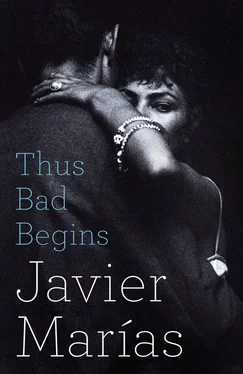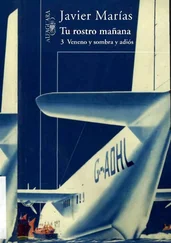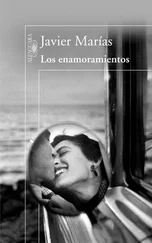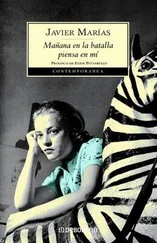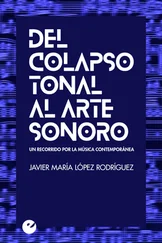I realized that I needed to answer very quickly and without hesitation, that any pause or vacillation wouldn’t necessarily point to me, but would indicate that I might know something or have my suspicions. I wanted to think — no, I was sure — that he was only asking because a couple of months or so before, I had been Beatriz’s custodian while he was in Barcelona filming his final sequences with Towers and Lom; I had been closest to her and her main witness. He wasn’t the suspicious type, it hadn’t even occurred to him that I could have anything to do with it. For him I was almost a callow youth. I summoned my wretchedly swift tongue, the tongue that both condemns and saves us, and said confidently:
‘No, Eduardo, Don Eduardo, I haven’t the slightest idea. How would I know who it was?’
And since I really couldn’t possibly know, I didn’t even have to lie.
Afterwards, I saw him less and less frequently and, in the end, almost not all. I wouldn’t say that we had become friends exactly, but while he may not have felt friendship for me, I felt it for him, and even though I no longer worked for him, I would have gladly continued to please and help him in anything he might reasonably have asked of me. But one quickly ceases to depend on someone who is no longer present on a daily basis, let alone at all hours and prepared to do any task. He never phoned me, and although I occasionally phoned him, I perhaps felt I was bothering him and didn’t want to insist, and so my calls became fewer and further between until I was just another person who had passed through his life and not stopped.
Despite his dislike of photos — which is why, for years, there had been so few full-face portraits of him — I began to see him appearing more in the press, but not because of any cinematographic projects or productions. In fact, he made only one more film and it wasn’t the one with Palance and Widmark, which took its place in the vast, crowded limbo of not-to-bes, and for which, I assume, he never managed to get the necessary financial support. He appeared in gossip magazines, doubtless reluctantly and unwillingly, first as the new partner and then as the husband of the impresaria Cecilia Alemany, who was attractive and wealthy enough to arouse more interest than him, for he, as he had once commented to me jokingly, was becoming a bit like Sara Montiel, only with an increasingly minority audience of archaeologists and film buffs and experts like Roy. I thought, too, that she was attractive enough to have made Beatriz lose all hope, had she ever known of her existence, or would always have been a threat. Someone who would have prevented her from taking any small trophy back to her woeful bed, saying to herself as she returned from her nocturnal incursion: ‘We’ll see.’
Muriel married for the second time just a year after he was widowed, in a discreet civil wedding to which I was not invited, not that there was any reason to include me in the cast, a mere former employee, a fleeting young man to whom he had given a job opportunity. Divorce had finally arrived in Spain when Muriel no longer needed it, and if Beatriz had lived, he might not even have made use of it, I sometimes think that the bonds of deceit and unhappiness are the strongest of all, as are those of error; they may bind even more closely than those of openness, contentment and sincerity. In the few pictures of the wedding available, I saw Van Vechten and Rico and Roy, as well as maestro Viana who adorned the ceremony — well, a bullfighter always lends colour to an occasion. There was no Gloria or Marcela or Flavia, the first two would have considered it a betrayal and the third perhaps preferred not to attend. I also saw the three children, older now, and all still identical to Beatriz. I looked for a long time at Susana: when she was just a little older, she would be the very image of her mother in those youthful photos that Beatriz kept on show out of nostalgia and persistence and which I had so often seen, the one with the dead child still alive in her arms and the one of her wedding to Muriel some twenty years before. I had a better understanding now of the expressions of both of them on that day: she smiling broadly and directly at the camera, revealing her obvious euphoria — or was it triumphalism? — a child disguised as a bride. He, on the other hand, seemed anxious, almost sombre, like a man convinced he’s taking on an enormous responsibility. She was playing at getting married, while he was seriously contracting a marriage, as if aware of the appropriateness of that verb when applied to obligations, debts and diseases. To her the world was a lightweight affair, as were the consequences of her actions, which, once over, were mere childish nonsense, the past; he was someone who already knew what it means to renounce something or who was aware that love always arrives late for its appointment with people, as he once gloomily told me, a phrase he had read in some book, although I don’t know which. In the pictures of his second wedding, there’s no trace of that, his one eye looks distracted and patient, with not a hint of seriousness. He seems merely to be going through the motions of a social formality and to be looking — without looking — at his watch.
I wondered how this new, artificial family would manage, if they would all live together in the apartment in Calle Velázquez or would start anew in another apartment; if the impresaria would gladly accept having an adolescent and two children — or two adolescents and one child — permanently around, especially when their father was away travelling, absorbed for months on end in the making of some film; if Flavia would leave them or be forced to emigrate to the new address. I considered phoning Muriel to congratulate him, but discovered to my surprise that even I felt that was a kind of betrayal. Absurdly enough, it would, it seemed to me, be like heaping more earth on Beatriz, regardless of the fact that she had chosen to be the first to start digging her grave on that lonely, shady road. Perhaps carnal bonds, however ephemeral and unmemorable and basically unimportant, oblige us to feel a certain irrational concern for the people with whom we have established those bonds; or perhaps it’s imposed on us by a ghostly personal sense of loyalty.
I went to see Muriel’s last film when it opened. It wasn’t generally well received, but I liked it. I phoned to tell him so, but he wasn’t in, and then I let the matter slide, because he didn’t exactly need my opinion. He hadn’t managed to make another film until five years after Beatriz’s death; and two years later, seven years after her suicide, I learned that my former boss and maestro had suffered a devastating heart attack while lunching with a group of boorish bankers from whom he was trying to extract a little small change for some new film project. As soon as I heard the news on television, I called Professor Rico, the only one in that circle with whom I’d remained in contact and with whom I’m still in touch today. By then, he was already a member of the Real Academia: his enemy papyruses — or were they mummies? — had all pegged out at a rate of knots and he’d been elected with more than enough votes, almost by acclamation, although he’s since acquired a few more splendid enemies, without whom he cannot live or only at the risk of getting royally bored. He was about to catch a plane to Madrid to attend the funeral, and he told me the hour and the place. That’s the only time I’ve heard a tremor of emotion in his voice. No, I lie, that tremor is always there whenever we speak of Muriel or Beatriz — he’s basically an old sentimentalist — even though it’s ages since they bade farewell to life without first bidding farewell to either of us.
The following morning, I went to La Almudena cemetery and stood before the grave I’d first seen some years before, although to me it felt like only yesterday: time vanishes when you return to a place you rarely visit and where you only go in sorrow or for some other exceptional reason. There were a lot of people and a fair number of journalists, and I kept well to the rear, not daring to push my way to the front. For most of those present I was a stranger, an interloper, an intruder, no one they need say hello to. Some distance away I saw Susana and her siblings with their backs to me, I recognized them at once despite the intervening years and despite how much the two younger ones had grown. Susana looked round now and again, perhaps so as to see how many people had come, how respected her father had been, until on one of those occasions, she spotted me and came running over to me. I was thirty by then and she was twenty-two, but she immediately hugged me hard and wept silently, in the wholehearted way one embraces someone who belonged to old, imperfect but far less sad times, when all those who should have been there still were; then she took my hand and led me over to the front row, along with Alicia and Tomás and Flavia and other people I didn’t know, including Cecilia Alemany, who doubtless found a moment to look at me from behind her dark glasses (she wasn’t chewing gum this time) and wonder indifferently who the hell I was: I don’t think she was much interested in the past of her short-lived and now late husband, and it occurred to me that she would probably now simply shake him off, like someone leaving behind her an episode that had been the fruit of weakness or seduction. During the rest of the ceremony, the lowering of the coffin and the replacement of the gravestone for the last time (no one else would fit in), Susana kept her hand in mine, squeezing my hand hard so as to steady herself, for as I said, she was far unsteadier on her feet than the widow or than anyone else. Or perhaps she clung to my hand like a stubborn child.
Читать дальше
